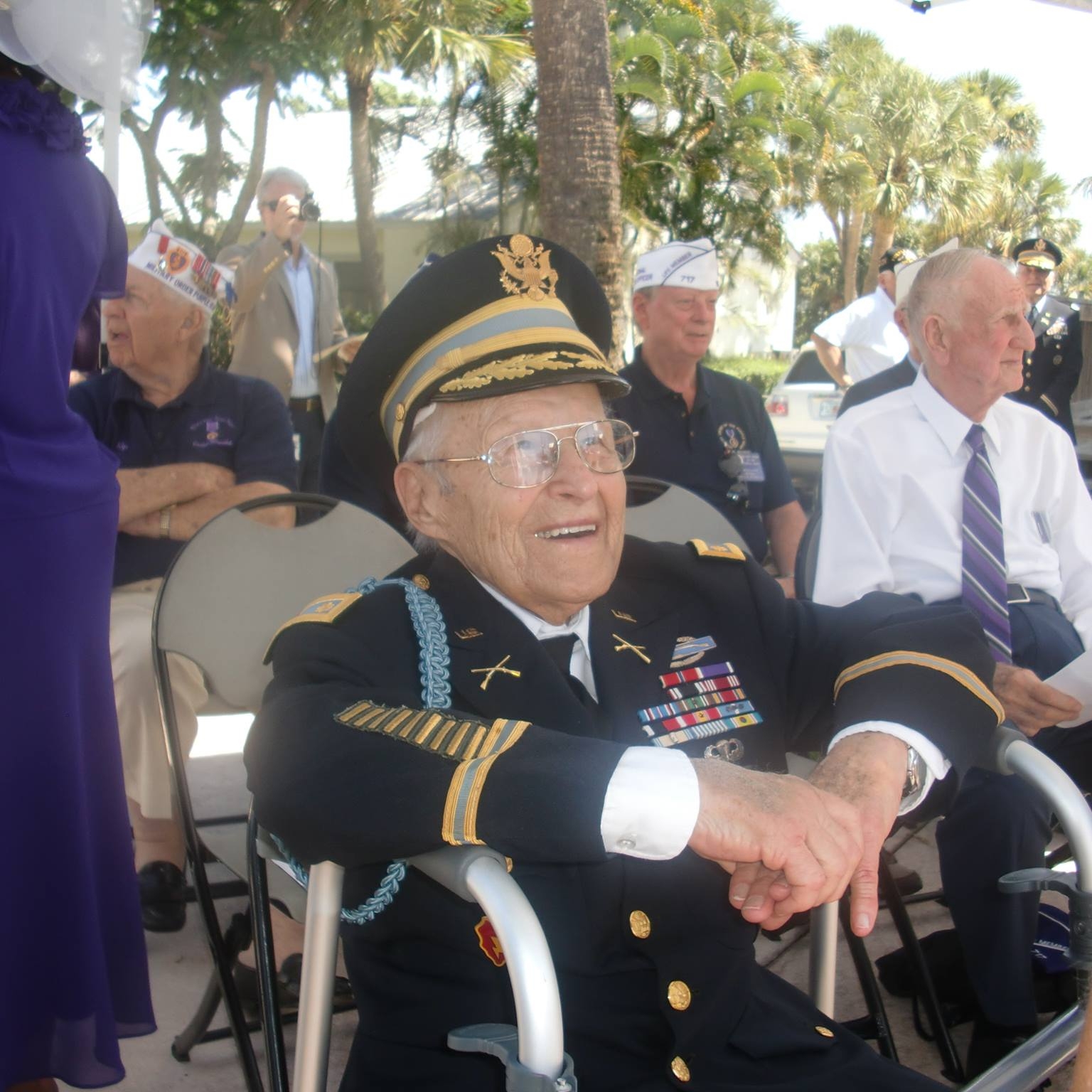The veterans of America’s wars have lived lives of sacrifice. One such man is retired Major Charles Winn.
Major Chuck Winn, Sr. will tell you today, at the age of 94, that he has always been “all army.” He was born in Grand Rapids, Michigan, 1923. In high school, he was a cadet office in the Junior ROTC when he graduated in 1941. He was drafted into the Army as a Private into the Army Air Corps in February, 1943, a year and a half later. When color blindness disqualified him from pilot training, Charles was transferred the Army Specialized Training Program at the University of Pennsylvania and later, to the combat engineers.
In November, 1944, Private First Class Winn landed in France from England with Company C, 292 Engineer Combat Battalion. After advancing through France, Belgium, Holland and into Krefeld, Germany he was sent to an accelerated officer candidate school in Fontainebleau, France. In May, 1945, Charles was commissioned an Infantry 2nd Lieutenant and assigned as a platoon leader with the 79th Infantry Division. He showed me an oversized aluminum Nazi eagle holding a swastika he took from a locomotive in Czechoslovakia that hauled one of Hitler’s “death trains.” He plans to donate it to the National Infantry Museum.
Lieutenant Winn was then assigned to the 1st Infantry Division which supported the International War Crimes Tribunals that brought Hitler’s surviving Nazi leaders to justice. He was the escort officer for the prosecution’s lead witness, General Erwin LaHausen, whose testimony implicated the defendants in the Holocaust and other war crimes. Charles found the Polish language, which his immigrant parents spoke at home, very useful during his Nuremburg assignment.
After returning home in July, 1946, Charles attended Grand Rapids Junior College and the University of Michigan. In January, 1949, he married his late wife of 62 years, Lorraine, who was a registered nurse.
In September, 1949 Major Winn returned to active duty from the Michigan National Guard. During his ninth month of occupation duty in Japan, the Soviet-trained North Korean army invaded the fledgling Republic of Korea in June, 1950. First Lieutenant Winn returned to battle as a platoon leader with Company C, 1st Battalion of the 24th Infantry Regiment, the Army’s last all African-American combat organization.
He fought with the brave 24th Infantry from the desperate Pusan Perimeter Defense all the way to the Yalu River on North Korea’s border with China. In November, hundreds of thousands of Communist Chinese Forces intervened on behalf of the North. His company was late receiving the divisional order for a general withdrawal the night of November 26, 1950. As his unit was attempting a breakout, 1st Lt Winn volunteered, like a shepherd looking for lost sheep, to search for an overdue patrol and was captured by enemy forces. In November, 2013, the Army awarded him the Bronze Star in recognition of his outstanding combat leadership.
He was held in a Chinese prisoner of war (POW) camp for 34 months. When a soldier is captured in war, according to the Geneva Convention, he is only required to give his name, rank and serial number. This is all that 1st Lt Charles Winn did. Though starved and beaten, he persistently resisted turning traitor—not only refusing to give information; but also by resisting multiple communist attempts at indoctrination through a technique known as “brain washing.”
During the harsh first winter he and his comrades endured food shortages, illness, freezing weather, and injuries inflicted by the Chinese which have caused him lifelong physical problems. A practicing Catholic, his faith, and the inspiration of his fellow POW, Father Emil Kapaun, helped him to survive. Captain Winn weighed only 100lbs at his release.
After his release, in August, 1953, Captain Winn finally met his son young Chuck, who had been born two months after he left for Japan.
Major Winn remained on active duty serving as a company commander and instructor at the U.S. Army Infantry School; a headquarters commandant and operations and intelligence officer at an Army ammunition depot in France, and as an advisor to reserve units in New England until he retired in January, 1966. His many awards and decorations include the Bronze Star, the Purple Heart for his POW wounds, the Prisoner of War Medal, the Combat Infantryman Badge, the Parachutist Badge, French Legion of Honor, and Republic of Korea Ambassador for Peace Medal.
Major Winn settled with his wife, Lorraine, in Stoughton, Massachusetts, where he completed a second career as a safety engineer with Aetna life and Casualty Company. In March, 1965, the couple retired to Tarpon Springs, Florida where they lived for 30 years. Three years after Lorraine’s death, in June 2014, he moved to Stuart to be closer to his son, retired Army Colonel Chuck and his wife Lynn. For more information contact wfbhofbuddy@gmail.com.
© 2017 "Hometown Heroes" Kelly Jadon

